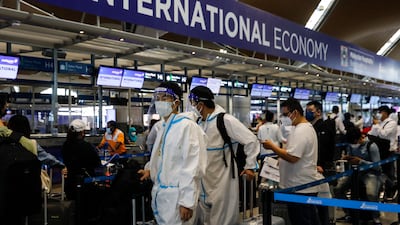Live updates: follow the latest news on Covid-19 variant Omicron
The World Health Organisation on Monday said the Omicron variant of concern posed a “serious global risk”, as countries rushed to restrict travel to southern Africa, the centre of the outbreak of the strain.
But apart from government measures, what can the public do to remain safe from a variant that has twice as many mutations as the Delta strain of Covid and – by some accounts – could be more transmissible?
In the early days of the pandemic, scientists said the disease could be transmitted easily on surfaces, where it could linger for days.
But guidance later changed — mask wearing was seen as vital for preventing airborne transmission, which was identified as the most common way for the virus to spread.
But scientists maintain that surface transmission is a danger and hand-washing and disinfecting surfaces that are touched regularly, in addition to social distancing, remains important.
Delta, identified in early 2021 and named in May, ripped through India as scientists said it was at least twice as infectious as previous variants. It soon became the dominant Covid-19 strain globally but health advice remained unchanged: wear a mask, maintain social distance and get vaccinated.
That is the situation now with the new variant. On Monday, WHO said “proven public health and social measures such as wearing well-fitting masks, hand hygiene, physical distancing, improving ventilation of indoor spaces, avoiding crowded spaces, and getting vaccinated”, remain vital.
If the Omicron variant is found to be more transmissible, that advice is unlikely to change but in the meantime, people would do well to take extra precautions.
For example, in August a study by scientists at Yale found that surgical masks were more than twice as effective as cloth masks for stopping particle transmission.
Some countries have introduced tougher requirements on mask wearing on public transport and in public places—it's now mandatory in the UK due to the emergence of Omicron, and anyone who refuses to wear a mask on transport or in retail outlets can be fined at least £200 ($267).
Likewise, LA County in California issued new guidelines, urging mask wearing in public.
"We know enough about Covid to take steps now that can reduce transmission as we prepare to better understand the additional strategies that may needed to mitigate this new variant of concern," a statement from the county said.
Italy has also introduced a vaccine passport for entering almost any public place — another sign that more countries are trying to raise the uptake of the vaccine among the population. France and the Netherlands are considering similar action.












